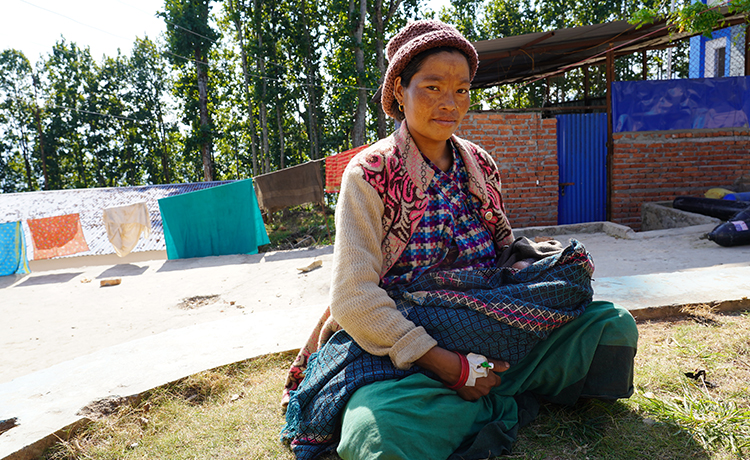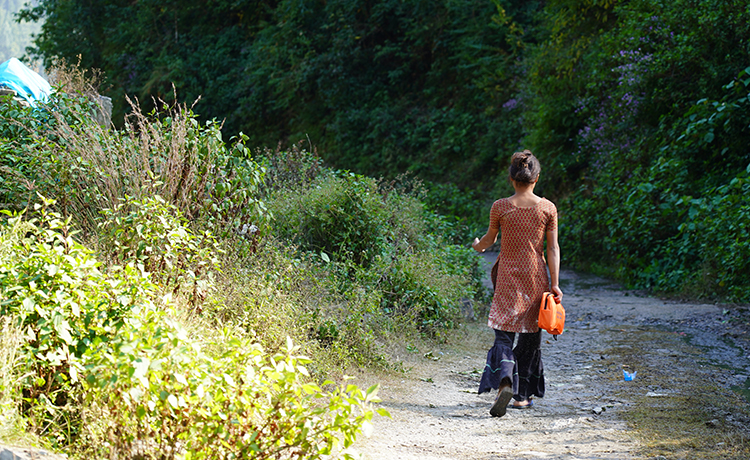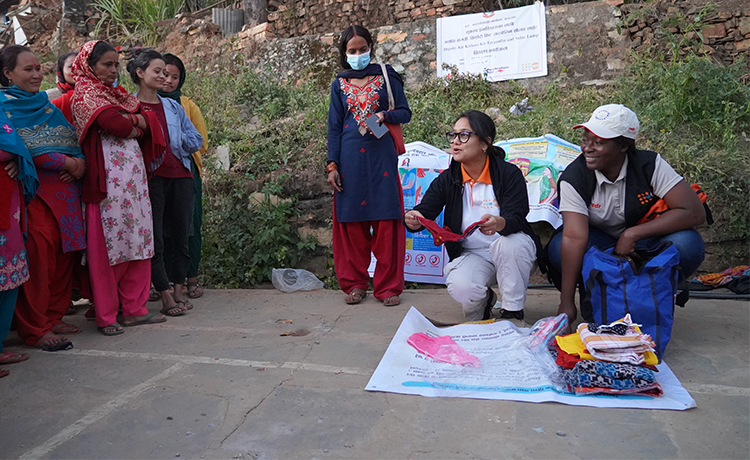News
Health, hygiene and protection needs spike after earthquake in Nepal
- 21 November 2023
News
KARNALI PROVINCE, Nepal – The strongest earthquake to hit Nepal in nearly a decade struck the country’s remote and mountainous western region on the night of 3 November, killing and injuring hundreds and sending 33-year-old Parbati Gharti Magar into early labour.
“Although a few weeks premature, my daughter is healthy,” Ms. Magar told UNFPA, the United Nations sexual and reproductive health agency. “I’m under observation for a few days because I lost a lot of blood.”
Thousands of buildings were destroyed in the initial 6.4-magnitude earthquake, and after more than 350 aftershocks, many people are still sleeping outside in freezing temperatures.
As she received treatment at the UNFPA-supported Jajarkot District hospital, Ms. Magar said “My husband and I are dreading going back home. We’ve been here since the night of the earthquake, and with all the aftershocks we fear that we may not have a home left to go back to with this child.”
Among the estimated 250,000 people estimated to have been affected across the two worst-hit districts of Jajarkot and Rukum West, more than 4,000 are pregnant women – of whom some 214 are likely to experience obstetric complications in the next three months. As 47 health facilities and birthing centres are confirmed damaged with critical services disrupted, women who are pregnant or breastfeeding are struggling to access essential antenatal, childbirth and postnatal care.
In the aftermath of the disaster, more than 80,000 women and girls of reproductive age have no access to sanitary supplies or reproductive health support. In Jajarkot, 14-year-old Sujata* told UNFPA, “I started my period yesterday but I don’t have hygiene products. I don’t know what to do.”

Protection needs spiralling
Indrani Malla, a mother of three, is numb with grief. She lost her husband in the earthquake and is camped out with her extended family in fields far from where their house used to be.
“She’s stopped taking care of herself, she doesn't even speak anymore,” said her niece Bhawana as she combed her aunt’s hair. “It’s been like this ever since the earthquake.
With thousands displaced and the winter season approaching, securing shelter and access to health services is crucial. The World Health Organization and local health authorities have warned of disease outbreaks , including cholera, due to the lack of sanitation and clean water.
As in all humanitarian settings, protection risks are rising for women and girls as families have lost homes and livelihoods and support services have been interrupted. Even before the earthquake, help for gender-based violence survivors at UNFPA’s one-stop crisis management centres was limited by the rough terrain in western Nepal and low capacity.
Around 10,000 women and girls will need access to prevention and response support for violence, discrimination, and early and child marriage – harmful practices that were already prevalent in Jajarkot and Rukum West and are likely to become more pervasive as coping mechanisms in the aftermath of the latest disaster.

UNFPA’s immediate and long-term response
UNFPA has set up three medical tents in Jajarkot and Rukum West, acting as temporary clinics to ensure continuity of reproductive health care. Psychosocial counsellors have been deployed and reproductive health kits distributed containing essential supplies for safe deliveries and obstetric emergencies, including miscarriages, sudden haemorrhaging and infections.

More than 4,700 dignity kits with hygiene supplies and 3,200 kishori packages for adolescents have been distributed so far. Winter sets containing warm clothes for 250 newborns and mothers and some 950 tarpaulins have also been provided, along with 450 solar-powered lamps to help with poor lighting and safety issues.
Sumitra, 15, was among nine family members in Rukum West who were fast asleep when the earthquake hit and their home collapsed. Having lost all their belongings, the extended family are now living in a makeshift tent. Sumitra was grateful for the supplies she and her mother received.
She told UNFPA, “We miss our home, we miss going to school… all our books and clothes are destroyed now. But we are glad that all of us are alive and still together as a family.”
With support from Australia and the Republic of Korea, UNFPA is working with the Government of Nepal on a long-term strategy to build resilience to crises. Reduced risks and stronger response mechanisms help to safeguard the sexual and reproductive health and rights of those affected, including protection from and prevention of gender-based violence.
*Name changed for privacy and protection